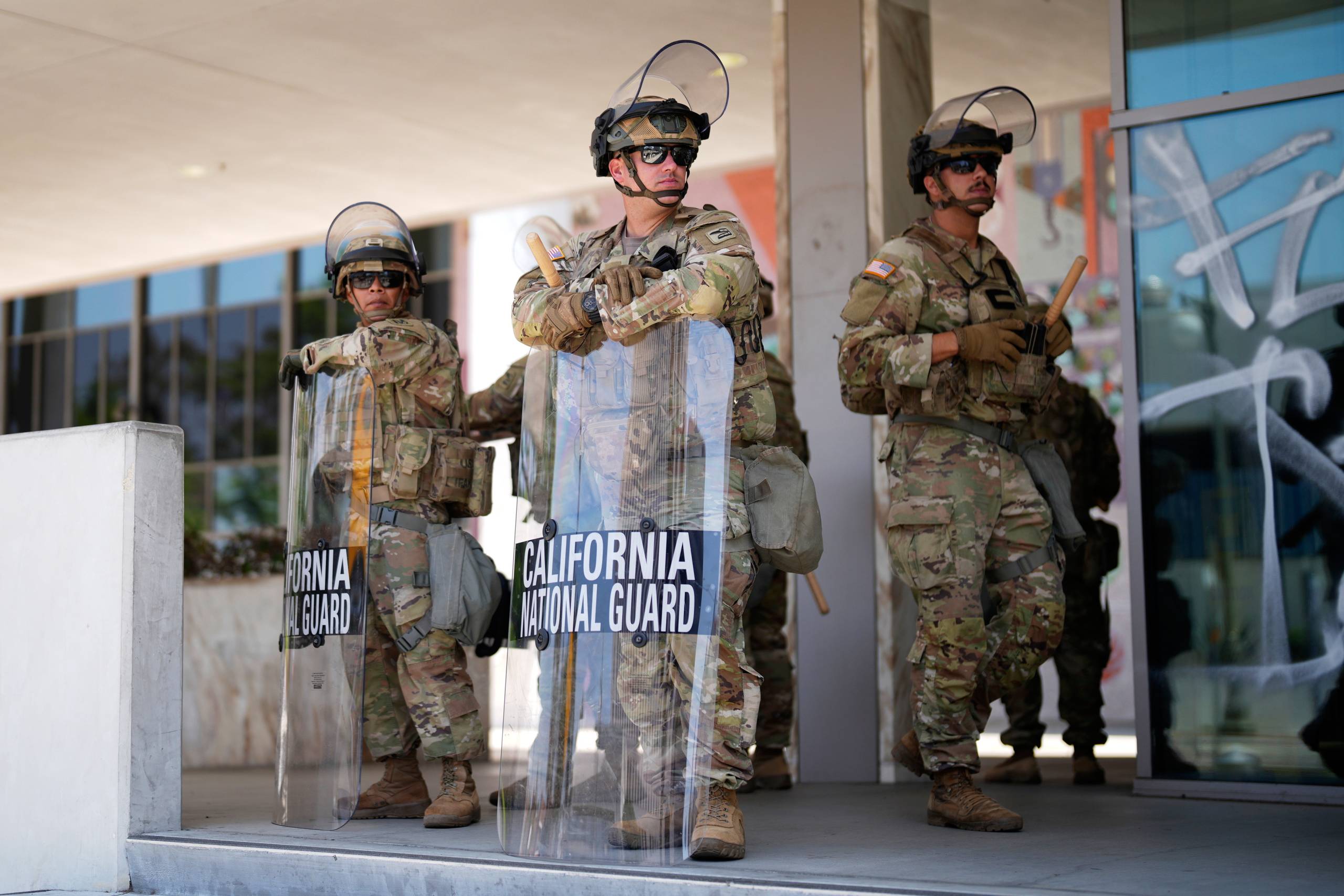But Bennett seemed wary of that argument. Even if he were to agree that the courts have the authority to review Trump’s decision, the judge asked, where in the law does it say that the courts should weigh whether the president considered lesser measures?
It’s unusual for an appeals court to block a temporary restraining order, but the case poses extraordinary questions about executive power, national security and how and when military troops can police civilian communities.
Trump’s mobilization of the guard came after protests broke out in and around Los Angeles on June 6, in reaction to his administration’s increasingly aggressive deportation efforts. It marked the first time since the 1960s Civil Rights Movement that a president seized control of a state’s National Guard without consulting the state’s governor; in that case, President Lyndon B. Johnson commanded the troops to protect protesters marching in Alabama.
In mobilizing the National Guard, Trump declared the immigration protests “a form of rebellion against the authority of the government.” He later called up 700 U.S. Marines as well.
The 9th Circuit panel has a number of options: It could affirm Breyer’s ruling, vacate it entirely, modify it, or delay a decision.
In his 36-page ruling last week, Breyer concluded that the president did not follow procedures set out by Congress when he federalized the troops without telling Newsom, and that the president also erred by labeling the protests a rebellion.
“His actions were illegal — both exceeding the scope of his statutory authority and violating the Tenth Amendment to the United States Constitution,” Breyer wrote. “He must therefore return control of the California National Guard to the governor of the state of California forthwith.”
In court last week, Breyer bristled at the federal government’s argument that the case shouldn’t be reviewable by the courts, noting that the U.S. was “founded in response to a monarch.” And he warned in his ruling that Trump’s actions federalizing the National Guard “threatens serious injury to the constitutional balance of power between the federal and state governments, and it sets a dangerous precedent for future domestic military activity.”
Critics have warned that if the courts allow the president to use troops in California, Trump won’t stop there. In the memo declaring the immigration protests a rebellion, the president did not name California or L.A., potentially leaving the door open to future deployment of troops in other cities.
California’s case is being supported by Democratic leaders in 22 other states, including 21 attorneys general and the Kansas governor, as well as a group of eight retired military officers. In a court filing, the group of four-star admirals and generals and former Army and Navy secretaries filed a brief in support of California’s position, arguing that deploying the National Guard and Marines “poses multiple risks to the core mission” of both branches and the troops’ well-being.
They wrote that the deployment diverts the troops from their primary mission, that they are not trained to conduct domestic law enforcement operations and that the “use of federal military personnel in the context of law enforcement operations should be a last resort to avoid the politicization of the military, which inevitably erodes public trust, impacts recruitment and undermines troop morale.”

“A bedrock principle of American democracy is that our military is apolitical,” the brief states. “Particular caution is therefore necessary if the U.S. military is to be deployed domestically in the context of a politically charged situation. This is especially so in situations that involve political protests and citizens exercising their First Amendment rights, which members of the United States armed forces are sworn to uphold. It is essential that such deployments be a last resort, especially in the context of policing protests and other constitutionally protected speech and activities.”
Newsom has also argued that using the National Guard for this purpose is hurting California by diverting the troops from important assignments, including fentanyl enforcement at the U.S.-Mexico border and preventing and fighting wildfires. On Tuesday, the governor’s office said the guard’s firefighting force, normally made up of more than 300 members, has lost more than half of its team, just as “peak wildfire season” approaches.
In a conversation on Substack shortly before the Tuesday hearing began, Newsom said democratic principles are at stake.
“[If] Donald Trump can unilaterally decide to militarize the streets of America — it happens to be in L.A., now, it will be in your city next,” Newsom said.
It’s not clear how the 9th Circuit will handle this case. Since the appeals court agreed to take the case, its decision could theoretically be appealed to the U.S. Supreme Court by either party.
In the meantime, both sides will continue briefing the lower court on California’s request that Breyer go further and issue a preliminary injunction in the case. A hearing is scheduled for Friday on that request. Over the weekend, Breyer denied the White House’s motion to delay it, writing that it would be counterproductive and that the facts on the ground continue to change.


